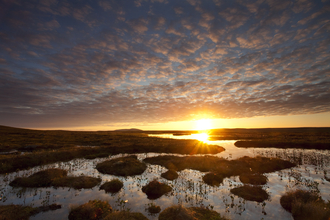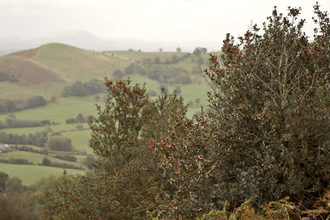What is COP27?
COP stands for 'Conference of the Parties' and these are UN conferences on its different conventions. In 2022, there are COPs taking place on both climate (COP27) and nature COP (COP15). COP27 is where world leaders come together to talk about climate change and how to tackle it, as it's the COP for the UN Framework Convention on Climate Change - and this meeting was their 27th!
COP27 took place between Sunday 6th November - Friday 18th November 2022, and is being hosted by Egypt in Sharm el-Sheik.
Last month the UN made it clear that without urgent action to reduce emissions we will not keep global warming below 1.5 degrees. Our new Prime Minister has said that there can be no long-term prosperity without action on climate change and no energy security without investment in renewables. It will not be easy, but with the political will it can still be done. And by protecting and restoring our habitats and looking after the soil here in Shropshire, we are not just bringing nature back, but also playing a vital role in capturing and storing carbon.Shropshire Wildlife Trust CEO
What did we want to see from COP27
We cannot restore nature without tackling climate change, and we cannot tackle climate change without restoring nature. The Wildlife Trusts want to see the bold rhetoric and ambitions translated into real action this decade to tackle the twin nature and climate crises together. Action to restore nature must therefore be central to negotiations at COP27.
A year on from COP26 in Glasgow, very little progress was made. Climate breakdown is accelerating rapidly, observed impacts are worse than expected, and soon they will outpace our ability to limit and adapt to them. In 2022, records have been broken across the planet including temperatures exceeding 40°C for the first time in the UK, and flooding in Pakistan reportedly covered one-third of the country, the worst ever seen.
Time is running out to avoid catastrophic warming above 1.5oC
If the UK wants to be a world leader on climate and nature, it must make sure it is taking the same action at home as it is encouraging others to take internationally, and support other countries to cope with climate change impacts already being felt.
Progress must be made by all governments in the UK to protect 30% of land and sea for nature by 2030. The UK must also strengthen, not weaken, its environmental protections - ensuring that our most precious wildlife sites are safe for future generations.
Protecting nature and prioritising resilience is becoming even more critical in the wake of global extreme weather events in 2022.
A Potted History
COPs are the ultimate decision-making meetings and this one will review progress made by the 197 nations and territories that have signed the UN's Convention on Climate Change.
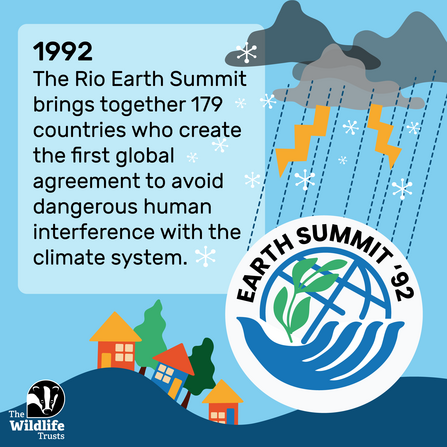
The Earth Summit concluded that the concept of sustainable development was an attainable goal for all the people of the world, regardless of whether they were at the local, national, regional or international level.
The summit triggered conversation and action at a global scale, which would eventually lead to international debate on climate issues.
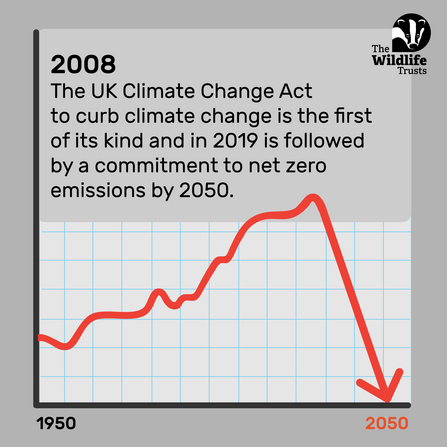
The Climate Change Act 2008 was the basis for the UK's approach to tackling and responding to climate change. It requires that emissions of carbon dioxide and other greenhouse gases are reduced and that climate change risks are adapted to.
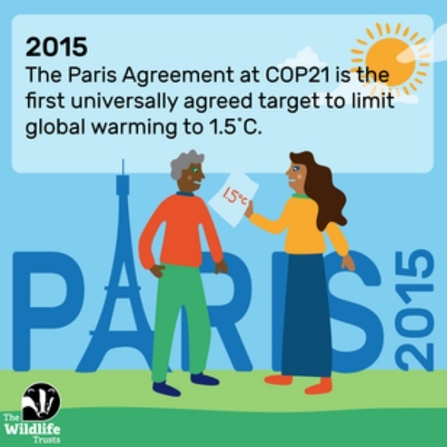
Each COP is hosted by a different nation, and two of the noteworthy COPs took place in 2015 and 2021.
COP21, which was hosted by Paris in 2015, resulted in the Parties (the 197 nations and territories) signing a new legally binding global treaty. This treaty committed those nations to ambitious action to limit average temperature change to 1.5oC above pre-industrial levels.

COP26, held last year in Glasgow, was the first real test of the commitment to delivering this agreement. During this meeting the Parties debated how they would achieve limiting temperature change to the agreed level.
The resulting Glasgow Climate Pact kept the ambition alive - but only just. Commitments to 'phase down' coal and end inefficient fossil fuel subsidies, were more aspirational than previous commitments - and smaller groups of countries also agreed to reduce methane emissions, halt deforestation, tackle transport emissions and end financing of overseas fossil fuels.
But action was missing on how to manage loss and damage from climate change, and provision of climate finance for countries on the frontline of climate impacts.
Want to learn more about COP27?
Use the links below find out more about COP27 and to find out how you can take climate change action.

